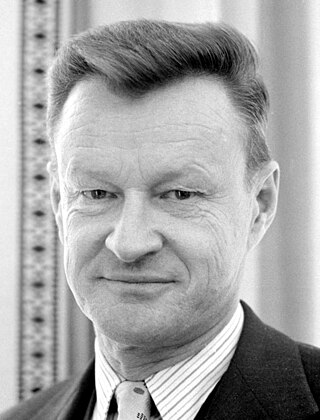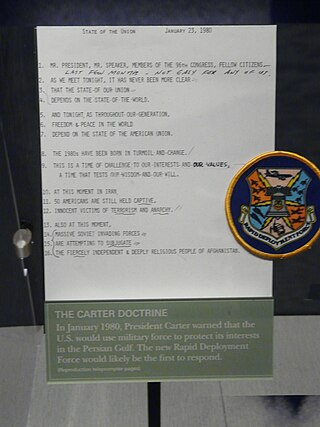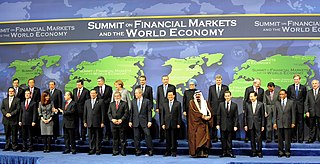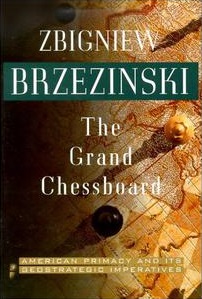Synopsis
Brzezinski sets the book up by giving his history of the Cold War, and how it was a combination of presidents, not just Ronald Reagan, and international events that lead to the demise of the Soviet system. He describes the two emerging views of the world as the "Globalization" view and the "Neoconservative" view. In each of the next three chapters, he describes the president, his foreign policy team, and the events and people which shaped that president's foreign policy. He focuses on three main factors, the "Atlantic Alliance," nuclear non-proliferation, and the Israeli/Palestinian conflict, but discusses other foreign policy issues (e.g. the environment, emerging South American nationalism, and the rise of China and India).
In the middle three chapters, "The Original Sin" (Bush I), "The Impotence of Good Intentions" (Clinton), and "Catastrophic Leadership" (Bush II), he compares the presidents and the decisions made or not made by their foreign policy teams. He is equally critical of Bush I and Clinton and rates them nearly the same, but with different strengths and weaknesses. He is harshest on the Bush II administration, particularly with regard to its treatment of the Atlantic Alliance, the Middle East, and the environment.
In the chapter titled "After 2008," Dr. Brzezinski suggests the next president must strengthen the Atlantic Alliance; reform lobbying; demonstrate leadership in the Middle East, particularly with regard to Israel/Palestine; foster consensus on the environment; and formulate a better strategy with regard to the emergence of China both as a world power and a force in the Middle East. He warns that America will have a second chance after 2008, but there definitely won't be a third chance.

Zbigniew Kazimierz Brzeziński, known as Zbig, was a Polish-American diplomat and political scientist. He served as a counselor to President Lyndon B. Johnson from 1966 to 1968 and was President Jimmy Carter's National Security Advisor from 1977 to 1981. As a scholar, Brzezinski belonged to the realist school of international relations, standing in the geopolitical tradition of Halford Mackinder and Nicholas J. Spykman, while elements of liberal idealism have also been identified in his outlook. Brzezinski was the primary organizer of The Trilateral Commission.

The Bush Doctrine refers to multiple interrelated foreign policy principles of the 43rd President of the United States, George W. Bush. These principles include unilateralism, preemptive war, and regime change.

The Carter Doctrine was a policy proclaimed by President of the United States Jimmy Carter in his State of the Union Address on January 23, 1980, which stated that the United States would use military force, if necessary, to defend its national interests in the Persian Gulf. It was a response to the Soviet Union's intervention in Afghanistan in 1979, and it was intended to deter the Soviet Union, the United States' Cold War adversary, from seeking hegemony in the Persian Gulf region.

The Trilateral Commission is a nongovernmental international organization aimed at fostering closer cooperation between Japan, Western Europe and North America. It was founded in July 1973 principally by American banker and philanthropist David Rockefeller, an internationalist who sought to address the challenges posed by the growing economic and political interdependence between the U.S. and its allies in North America, Western Europe, and Japan.

A great power is a sovereign state that is recognized as having the ability and expertise to exert its influence on a global scale. Great powers characteristically possess military and economic strength, as well as diplomatic and soft power influence, which may cause middle or small powers to consider the great powers' opinions before taking actions of their own. International relations theorists have posited that great power status can be characterized into power capabilities, spatial aspects, and status dimensions.

In international relations, a middle power is a sovereign state that is not a great power nor a superpower, but still has large or moderate influence and international recognition.
A United States presidential doctrine comprises the key goals, attitudes, or stances for United States foreign affairs outlined by a president. Most presidential doctrines are related to the Cold War. Though many U.S. presidents had themes related to their handling of foreign policy, the term doctrine generally applies to presidents such as James Monroe, Harry S. Truman, Richard Nixon, Jimmy Carter and Ronald Reagan, all of whom had doctrines which more completely characterized their foreign policy.

Brent Scowcroft was a United States Air Force officer who was a two-time United States National Security Advisor, first under U.S. President Gerald Ford and then under George H. W. Bush. He served as Military Assistant to President Richard Nixon and as Deputy Assistant to the President for National Security Affairs in the Nixon and Ford administrations. He served as Chairman of the President's Foreign Intelligence Advisory Board under President George W. Bush from 2001 to 2005, and advised President Barack Obama on choosing his national security team.
The term "new world order" refers to a new period of history evidencing dramatic change in world political thought and the balance of power in international relations. Despite varied interpretations of this term, it is commonly associated with the notion of some degree of world governance in either a negative or positive sense.
The term liberal hawk refers to a politically liberal person who supports a hawkish, interventionist foreign policy.

The Grand Chessboard: American Primacy and Its Geostrategic Imperatives (1997) is one of the major works of Zbigniew Brzezinski. Brzezinski graduated with a PhD from Harvard University in 1953 and became Professor of American Foreign Policy at Johns Hopkins University. He was later the United States National Security Advisor from 1977 to 1981, under the administration of President Jimmy Carter.

Criticism of United States foreign policy encompasses a wide range of opinions and views on failures and shortcoming of United States foreign policy and actions. Some Americans view the country as qualitatively different from other nations and believe it cannot be judged by the same standards as other countries; this belief is sometimes termed American exceptionalism. This belief was particularly prevalent in the 20th century. It has become less dominant in the 21st century as the country has become more divided politically and has made highly controversial foreign policy decisions such as the Iraq War. Nevertheless, America is an extremely powerful country from an economic, military and political point-of-view, and it has sometimes disregarded international norms, rules and laws in its foreign policy.

Ivo H. Daalder, is President of the Chicago Council on Global Affairs and has served since July, 2013. He was the U.S. Permanent Representative on the Council of the North Atlantic Treaty Organization (NATO) from May 2009 to July 2013. He was a member of the staff of United States National Security Council (NSC) during the administration of President Bill Clinton, and was one of the foreign policy advisers to President Barack Obama during his 2008 presidential campaign.
In international relations, the term smart power refers to the combination of hard power and soft power strategies. It is defined by the Center for Strategic and International Studies as "an approach that underscores the necessity of a strong military, but also invests heavily in alliances, partnerships, and institutions of all levels to expand one's influence and establish legitimacy of one's action."
The Group of Two is a hypothetical and an informal grouping made up of the United States of America and People's Republic of China that was first proposed by C. Fred Bergsten. While the original concept had a strong economic focus, more recent iterations have a more all-encompassing focus. This is the result of the concept gaining more traction with members of the Obama Administration and foreign policy establishment who came to recognize the increasing importance of America's relationship with China. Prominent advocates of the grouping include former National Security Advisor Zbigniew Brzezinski, historian Niall Ferguson, former World Bank President Robert Zoellick and former chief economist Justin Yifu Lin.
Helena Cobban is a British-American writer and researcher on international relations, with special interests in the Middle East, the international system, and transitional justice. She is a non-resident Senior fellow at the Washington DC-based Center for International Policy. She is the founder and CEO of the book-publishing company, Just World Books and the Executive President of the small educational non-profit organization, Just World Educational. Having contributed throughout her career to numerous media outlets and authored seven books, she resumed her writing career in 2019.
David Laurence Aaron is an American diplomat and writer who served in the Jimmy Carter and Bill Clinton administrations. He graduated from Occidental College with a BA, and from Princeton University with an MPA. He later received an honorary Ph.D. from Occidental College. He is currently director of the RAND Corporation's Center for Middle East Public Policy.

Reality-based community is a derisive term for people who base judgments on facts. It was first attributed to a senior official working for U.S. president George W. Bush by the reporter Ron Suskind in 2004. Many American liberals adopted the label for themselves, using it to portray themselves as adhering to facts in contradiction to conservatives presumed to be disregarding professional and scientific expertise.

The United States foreign policy during the presidency of Jimmy Carter (1977–1981) was dominated by the Cold War, a period of sustained geopolitical tension between the United States and the Soviet Union.












